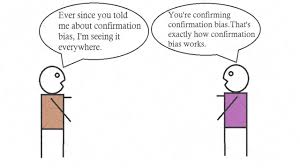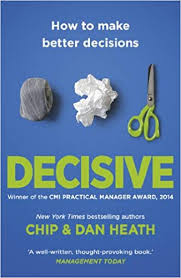DECISIVE – HOW TO MAKE BETTER DECISIONS?
Featured
DECISIVE – HOW TO MAKE BETTER DECISIONS?
Reviewed by Mr. Anirudh Gupta, Member
Non-Fiction
Publisher: Penguin Random House
Price: INR 450.
We are nothing but the sum of the decisions we have taken to this point of our life. What if we learn to improve our decision making? It would help us to live better life and better relationships
Let us examine how from a book review of “DECISIVE-How to make better decisions?”
All of us make certain basic mistakes when it comes to decision making
- Avoid narrow framing
It can be a personal decision for “Should I breakup or not? Or Should I fire him or retain him?
Many of the times we miss the woods for the trees. When we look broader beyond the usual pressing day to day issues we see potential both in the situation or people.
One useful way is to look at the entire picture and learn to see both the positives and negatives in context. Adding an and could be useful.
For e.g.: Can I do this and that? In most situations and is a realistic possibility and probably the only way for personal and organizational growth.

- Confirmation bias
Most managers seek validation of their pet hypothesis. Nothing wrong in it except that it may cost you in terms of your career and the organization lost opportunity and Capital.
One way to get out of the trap is “to seek an opposite view”. Many a times for critical organizational decisions the entire executive team just wants to roll out the decision without considering the trade offs and a broader impact. A good board helps to mitigate this risk
A good approach is to “explore all approaches and structurally mitigate the key risks”
- Short term emotions
The good is the enemy of the best. Short term emotions derail us and only help to accentuate the gap between what we are and what we can be.
For eg: If you are undergoing a weight loss program, a short term emotion is to binge at least once a week. A good question is to ask is “What level of health do we want? And then take a decision.
Similarly in executives there is a strong urge to look at the short term. In that situation one can ask oneself “What would I ask my best friend to do? Or “What would my successors do?
4. Prepare to be wrong
Most seasoned executive teams do identify the situations where a clear procedure exists to mitigate the risks out of the actions decided. If the strategy or tactics are not working, new ideas /people are to be introduced to ensure that growth happens in the right manner.
A good question is asked is “Where we can be wrong”? And prepare a plan B.Many a times more money is made in Plan B than in plan A.
Hopefully the above helps to think properly before arriving at a decision.

